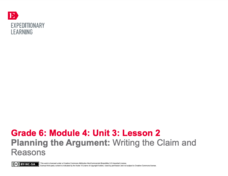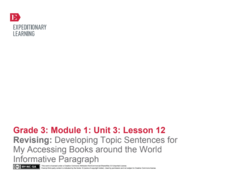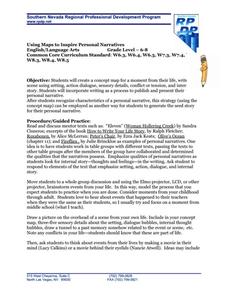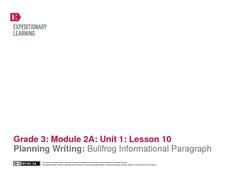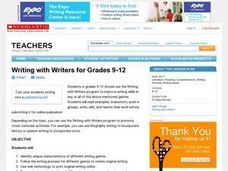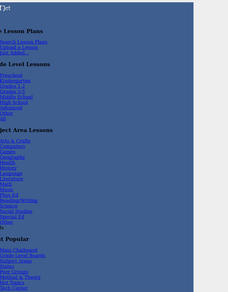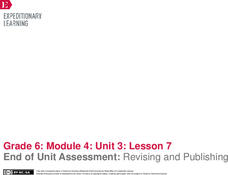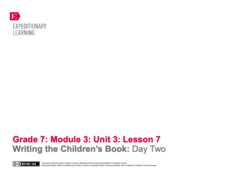Curated OER
The Writing Process
Introduce young writers to the writing process. Activities model the steps in the writing process (prewriting, drafting, revising, editing, polishing). A logic tree template is also included.
Curated OER
Lesson Plan 17: Novel, Take 2
It's all about using peer resources in this writing process lesson, which includes a fantastic novel revision worksheet packet. Learners have read a partner's story draft the night before, and groups have a "lightning round of...
Curated OER
Writing and Autobiography
Are you working on an autobiographical or narrative writing unit? Bring this lesson to your class, as it takes young writers through the process of drafting and sequencing an autobiography. After observing and demonstrating steps of the...
Curated OER
Write Right!
After watching part of a Club Write Kids video and discussing the editing process, each group of learners writes a letter to a favorite author. They ask for a copy of a page of manuscript that has gone through the editing process. Prior...
EngageNY
Planning the Argument: Writing the Claim and Reasons
Step up! Using the resource, scholars discover the six steps to writing an effective position paper. Next, they work on a graphic organizer to begin planning their argument-based essays.
Curated OER
Our Dinopals with WordArt
Elementary schoolers use the writing process steps to write a descriptive paragraph about a fictional dinosaur. Using a tech tool lesson, they create a graphic title for the paragraph. A nice blending of technology with "old-fashioned"...
EngageNY
End of Unit 2 Assessment, Part 2: Revise Essay Drafts
Positive feedback is a great way to improve writers' skills. Scholars receive their draft essays back with teacher comments and start the revision process. Next, they prepare to begin their final drafts at home.
Curated OER
Narrative Writing: Using Exact Words
Review the narrative writing process with your emerging story writers. They read a sample narrative and identify five vague verbs that could be replaced with a more exact, exciting verb. Then they write a personal narrative making sure...
EngageNY
Revising: Developing Topic Sentences for My Accessing Books Around the World Informative Paragraph
Revision is an important part of the writing process. Focus on revising topic sentences and details with the plan described here. This is part of a unit, so pupils have already filled out a graphic organizer about traveling...
Southern Nevada Regional Professional Development Program
Using Maps to Inspire Personal Narratives
A solid description of one way to teach narrative writing, this resource outlines the writing process from concept to completion. Class members create concept maps of moments in their lives and follow the writing process to publish their...
Curated OER
Developing a Topic for Writing Using an Idea Web
Teach your upper graders how to use an idea web to develop a topic for writing. After reading a variety of stories about friendship (a list of stories with the theme of friendship is included), model using an idea web. Class members...
EngageNY
Writing, Critique, and Revising: Two-Voice Poems (Chapter 14: "Las Ucas/Grapes")
Continue work on the two-piece poem that compares two characters from Esperanza Rising. Give class members a few minutes to finish their drafts. After they have a complete product, model how to critique and edit the poems with one group....
EngageNY
Mid-Unit Assessment: Completing My Draft Position Paper
What's the difference? Scholars analyze the similarities and differences between introductory and concluding paragraphs. Then, using a model essay as a guide, they write their draft position papers.
EngageNY
End of Unit 1, Assessment, Part 2: Revise Essay Drafts
As a culminating unit activity, pupils revise their argumentative essays based on the novel Lyddie by Katherine Paterson. Paying careful attention to grammar, punctuation, and vocabulary, they incorporate teacher feedback to revise and...
EngageNY
Planning Writing: Bullfrog Information Paragraph
Lesson ten in this unit for the book Bullfrogs at Magnolia Circle, prepares third graders to begin writing an informational paragraph about the adaptations of bullfrogs. First, young writers work either independently or in pairs to...
Curated OER
Writing with Writers for Grades 9-12
Have your class examine the characteristics of various writing genres using the Writing with Writers online project. Detailed instructions for how to introduce, discuss, and develop a piece of writing for each genre are included. Class...
Curated OER
Narrative Writing Lesson
Sixth graders experience the stages of process writing, work cooperatively, to critique and to incorporate software tools to enhance writing and problem solving skills.
Curated OER
The Writing Process
Fifth graders analyze well written and poorly written essays and define the four steps in the writing process. In this writing lesson plan, 5th graders edit poorly written essays.
EngageNY
End of Unit Assessment: Revising and Publishing
Dictionaries, thesauruses, word walls, oh my! Pupils use several resources to revise their position papers to include appropriate vocabulary. Then, after peer editing, scholars write the final drafts of their essays and self-assess using...
EngageNY
Performance Task Preparation: Peer Critique and Mini-Lesson Addressing Common Errors: Revising Draft Essay to Inform
Time to revise! Using a writing evaluation rubric, scholars participate in a peer editing process to provide feedback on each others' informative essays. Next, pupils begin revising their drafts based on the feedback they receive.
Scholastic
Writing An Acrostic
Invite learners to introduce themselves through poetry. After brainstorming and choosing details, pupils draft two acrostic poems using their names as the base. They then evaluate and revise their poems.
ReadWriteThink
Persuasive Essay: Environmental Issues
Young environmentalists learn how to craft a persuasive essay about an environmental issue they consider important. After studying the components of a persuasive essay and examining a student model, writers brainstorm possible topics and...
EngageNY
Writing the Children’s Book: Day Two
Following a brief mini-lesson on using dialogue in fiction, young writers continue day two of their writing workshop. They work on the second half of their Children's Book Storyboards, and then they turn and talk with partners to reflect...
EngageNY
Revising Draft Letters to a Publisher about an Athlete’s Legacy: Critique and Feedback, Part I
Pick a corner, any corner! Pupils use the Four Corners strategy and Peer Critique protocol to assess one another's draft letters to a publisher about an athlete's legacy. Scholars then use peer feedback to revise their letters.






